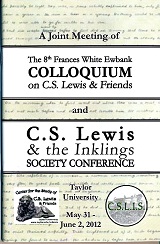Event Title
Academic Paper Session 1-B
Location
Rupp 205
Start Date
31-5-2012 7:45 PM
Description
"C.S. Lewis's Lost Arthurian Poem" - Joe R. Christopher
C.S. Lewis aficionados know his unfinished "Launcelot," collected in Narrative Poems; but fewer know that he wrote an Arthurian poem intended for his first book, Spirits in Bondage, which was rejected by his publisher. The manuscript has since been lost, but a few things can be known or reasonably conjectured about the poem. This paper will cover the following topics:
(1) Lewis's mention of the poem in his correspondence with Arthur Greeves,
(2) its title,
(3) its date of composition,
(4) its source (quoted),
(5) its probably application for Spirits in Bondage, and
(6) the loss of its manuscript
"Feminine Leadership: Lewis's Reason and Spenser's Britomart" - Jonathan Himes
Scholars have debated the apparent sexism in many of Lewis's statements and in his views on female clergy. Without addressing these particular issues of importance in Lewisian studies, this paper will analyze Lewis's choice of a female virgin in the role of Reason who topples the giant Spirit of the Age in his early allegory, The Pilgrim's Regress. Besides the obvious influence of Bunyan's Pilgrim's Progress on this work and the feminine figures of the divine in George MacDonald's fiction as another influence, Edmund Spenser's female knight Britomart may have provided Lewis with the idea of a strong feminine leader who steps in to show the would-be hero how to conquer one's competing impulses.
"Further Responses to Lewis's Lost Aeneid" - Richard James
For almost fifty years, since his death in 1963, C.S. Lewis, Lazarus-like, has continued through his literary executors to come forth from his literary grave, providing an almost unending, vast landscape of multimedia productions from multi-volume collections of personal letters and anthologies of essays to four major Hollywood film productions; from miscellaneous small action figures and early reader literacy booklets connected to the Narnian movies to highly technical on-stage renditions of the demonic Screwtape and the verbally combative, but highly successful off-Broadway drama, Freud's Last Session.
But beyond all of these highly visible projects, this paper will provide some reflections on what is yet another more recent and more substantial Lazarus-like Lewis project: C.S. Lewis's Lost Aeneid. For here in this book is a translation both immensely personal to Lewis and also potentially a significant scholarly contribution to the instruction and understanding of one of the world's great epics. This paper shall make a brief analysis of the many published responses to Lewis's partial translation, note several places where Virgil is mentioned in the Lewis corpus and also provide insights gathered from a study of Lewis's own annotations in his personal library copy of the Works of Virgil.
Event Type
Paper
Link to Papers
C.S. Lewis's Lost Arthurian Poem: A Conjectural Essay
Feminine Leadership: Lewis's Reason and Spenser's Britomart (Not available)
Academic Paper Session 1-B
Rupp 205
"C.S. Lewis's Lost Arthurian Poem" - Joe R. Christopher
C.S. Lewis aficionados know his unfinished "Launcelot," collected in Narrative Poems; but fewer know that he wrote an Arthurian poem intended for his first book, Spirits in Bondage, which was rejected by his publisher. The manuscript has since been lost, but a few things can be known or reasonably conjectured about the poem. This paper will cover the following topics:
(1) Lewis's mention of the poem in his correspondence with Arthur Greeves,
(2) its title,
(3) its date of composition,
(4) its source (quoted),
(5) its probably application for Spirits in Bondage, and
(6) the loss of its manuscript
"Feminine Leadership: Lewis's Reason and Spenser's Britomart" - Jonathan Himes
Scholars have debated the apparent sexism in many of Lewis's statements and in his views on female clergy. Without addressing these particular issues of importance in Lewisian studies, this paper will analyze Lewis's choice of a female virgin in the role of Reason who topples the giant Spirit of the Age in his early allegory, The Pilgrim's Regress. Besides the obvious influence of Bunyan's Pilgrim's Progress on this work and the feminine figures of the divine in George MacDonald's fiction as another influence, Edmund Spenser's female knight Britomart may have provided Lewis with the idea of a strong feminine leader who steps in to show the would-be hero how to conquer one's competing impulses.
"Further Responses to Lewis's Lost Aeneid" - Richard James
For almost fifty years, since his death in 1963, C.S. Lewis, Lazarus-like, has continued through his literary executors to come forth from his literary grave, providing an almost unending, vast landscape of multimedia productions from multi-volume collections of personal letters and anthologies of essays to four major Hollywood film productions; from miscellaneous small action figures and early reader literacy booklets connected to the Narnian movies to highly technical on-stage renditions of the demonic Screwtape and the verbally combative, but highly successful off-Broadway drama, Freud's Last Session.
But beyond all of these highly visible projects, this paper will provide some reflections on what is yet another more recent and more substantial Lazarus-like Lewis project: C.S. Lewis's Lost Aeneid. For here in this book is a translation both immensely personal to Lewis and also potentially a significant scholarly contribution to the instruction and understanding of one of the world's great epics. This paper shall make a brief analysis of the many published responses to Lewis's partial translation, note several places where Virgil is mentioned in the Lewis corpus and also provide insights gathered from a study of Lewis's own annotations in his personal library copy of the Works of Virgil.


